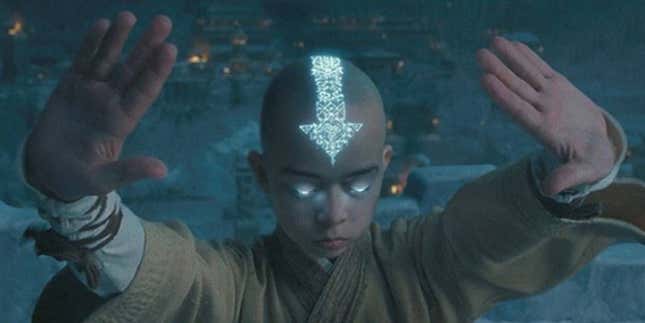Adaptations can be tricky, particularly when the source material is animated. More often than not, they’re reviled upon reveal, because they often feel like they’re going through the motions or twisting the original thing into something it’s not. It can be a dismal prospect to see something you grew up with lose its identity, and things get even worse when you can’t really let it go.
How The Last Airbender Inspired Lisette Olivera
Last weekend, I watched The Last Airbender, M. Night Shyamalan’s 2010 adaptation of Nickelodeon’s Avatar series. I’d made an active choice to avoid the movie back then, largely because the cast was whitewashed as hell. And beyond catching the last 15 minutes on TV forever ago, I hadn’t ever seen the full thing. Now that I’ve done so, after years of hearing it described as the worst thing ever… it’s just a mediocre adaptation. There’s nothing remarkable about it being bad, other than how it sucking was definitive for an entire generation of kids. To be honest, I was a little disappointed it wasn’t actively worse, but then I started to think about why the movie and its badness stuck around in audiences’ minds for so long.
In the mid and late-2000s, studios were trying to anything that could possibly strike with the same impact as Harry Potter movies. At the time, films based on kids books like Eragon and The Spiderwick Chronicles did okay or fizzled out, and while Dragonball Evolution hurt anime’s Hollywood aspirations for a decade, the medium wasn’t quite a juggernaut yet. The original Avatar show arrived at the right time in 2005: it looked enough like anime to stand out, but came without having any of the negative baggage attached to anime back then. And what made it feel even more special back then was how it was actively aging up with its audience, something cartoons weren’t really doing at the time.

Avatar was a show for 11-year-olds, and it was formative in the way good shows often are when they hit you at the right moment. The Last Airbender movie was very clearly aimed at fans of the show, which had wrapped in 2008. Two years was just long enough for some wistfulness for the original show to kick in… which made it all the more heartbreaking that the movie just blows. Whatever small bright spots it has, like Dev Patel and Aasif Mandvi being the only ones trying to give performances as Zuko and Zhao, are quickly overwhelmed by a film that makes it clear from the jump it’s going to be a stinker.
Condensing a 20-episode series into a film was never going to be easy, and it’d be foolish to think the movie was going to get as much in as possible. But it’s still pretty startling to see this movie adapt a handful episodes and leave it at that—something made worse by how half-hearted the effort feels. The “best” of the bunch is really only the assault on the Northern Water Tribe toward the very end, and that’s really only because the movie does a decent job at giving Aang’s waterbending big tidal wave a sense of scale. (But even that doesn’t hit the same as the giant water kaiju in the finale of the show.)
In that sense, I can get why series creators Bryan Konietzko and Michael Dante DiMartino would align with Netflix to take another live-action stab at their own work. (After a split from Netflix due to “creative differences,” they headed to Nickelodeon to head up Avatar Studios, where they’re developing an Avatar animated film, among other projects.) As for the general public, it feels weird to still give the 2010 film oxygen; at its best, Netflix’s upcoming live-action take on the material—an eight-episode series made without Konietzko and DiMartino, and arriving on the streamer February 22—can really only make us go “well, it’s better than the last one.” But the larger Avatar series pretty much recovered from it around the third season of Legend of Korra, and it’s not like this is ever going to get a reexamination like the Star Wars prequels or several pre-MCU Marvel movies from Fox.
The Last Airbender’s biggest fault was how much it didn’t really do right by the source material or even have its own novel spin on things to distract from what it lacked. As an adaptation, it commits the cardinal sin of existing for its own sake and not being additive in any real way. Overall, it’s just dull and annoying—but not enough to hold a 14-year grudge.
Want more io9 news? Check out when to expect the latest Marvel, Star Wars, and Star Trek releases, what’s next for the DC Universe on film and TV, and everything you need to know about the future of Doctor Who.






